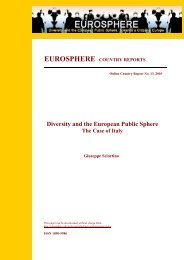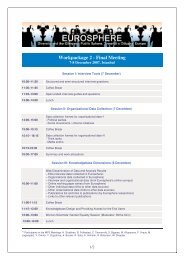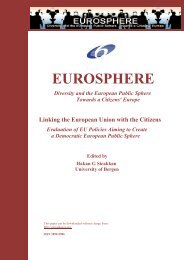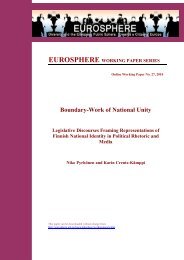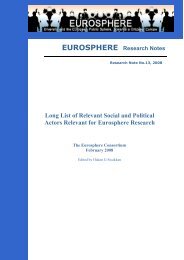Migrants, Minorities, Belongings and Citizenship. Glocalization and ...
Migrants, Minorities, Belongings and Citizenship. Glocalization and ...
Migrants, Minorities, Belongings and Citizenship. Glocalization and ...
You also want an ePaper? Increase the reach of your titles
YUMPU automatically turns print PDFs into web optimized ePapers that Google loves.
where the global values, ethics, <strong>and</strong> worldviews have found their local expressions in<br />
local places. The glocal spaces <strong>and</strong> mobile minds accommodated in these spaces are the<br />
best examples of this development. The findings of Glocalmig indicate that there is a<br />
considerably strong association between spatial mobility <strong>and</strong> mental mobility patterns on<br />
the one h<strong>and</strong> <strong>and</strong> between participation in glocal spaces <strong>and</strong> mental mobility patterns on<br />
the other h<strong>and</strong>. However, the Glocalmig findings also indicate that individuals with very<br />
high degrees of mind mobility choose not to think in terms of territorial <strong>and</strong> cultural<br />
boundaries. The basic strategy of European integration <strong>and</strong> involvement has been the<br />
encouragement of individuals’ spatial mobility across national <strong>and</strong> regional borders.<br />
However, it is a fact that people move much less than predicted in the first place.<br />
Therefore, the euroglocalization strategy <strong>and</strong> the increase in mobility of mind it will<br />
breed, if also thorough Europewide studies of the glocal spaces validate the findings<br />
here, may provide an alternative to spatial mobility by bringing Europe to the local<br />
contexts instead of making people move in order to learn to care for Europe. This will, in<br />
practice, require:<br />
- encouragement of the development of glocal sites in European cities;<br />
- encouragement of also the second country nationals to attend these places along<br />
with the majority citizens, citizens who are national minorities, citizens <strong>and</strong><br />
residents with immigrant background.<br />
The above recommendation should primarily be understood as a call for further research<br />
on a possible, alternative, or additional way to go in order to create a more inclusive <strong>and</strong><br />
egalitarian diverse society in Europe.<br />
110



